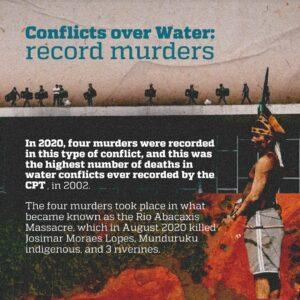Defending the World’s Oceans, Water, and People
World Oceans Day offers us an opportunity to reflect on our connection to water. We’re born out of it, made mostly from it, and depend upon it for much of our daily existence. Water plays an essential role in our lives.
As such, it is a fundamental component of countless struggles across the world — struggles over territory, human rights, identity, culture and more. And it is equally fundamental to the solutions communities are building as they work together to confront multiple crises. Today, and for the remainder of the month, we are focusing on the theme of water for its importance to our movements.
Water has a number of features that make it complex, but these same features also make it a particularly exciting and promising area of convergence. Among these is water as a fluid form of territory. Water can’t be fully contained; it has no reverence for geopolitical boundaries; it can’t be neatly parceled out; and sometimes it can’t even be seen.
Such features pose governance challenges and make water particularly susceptible to corporate abuse and conflict, while also inspiring community organizing around water as a common good and innovative forms of community water management. The latter are becoming ever more important to collective survival in the face of increasing droughts and floods brought by climate chaos.
Water is also unique in its connective powers. Issues from water pollution to hydropower megaprojects to pipeline construction connect individuals in a given locale in common struggle. At the same time, water’s fluidity means that such issues connect communities many miles – even countries or continents – apart in common struggle as well. Below are just some of the struggles around water our movement partners and allies are waging.
Water is a Human Right
Like access to healthcare, food, and land, water is a human right. We literally cannot exist without it. And like other rights in our thoroughly unequal societies, increasing threats to water are felt most acutely by marginalized populations. The injustices of racism, colonialism, and capitalism seep through our waterways and drinking systems.
We can see this clearly in U.S. communities like Flint, Michigan. After switching over the water system to a cheaper, contaminated water source — a form of austerity against the city’s largely working-class and Black residents — Flint and Michigan officials quietly hid the extent of the lead contamination. It took years of local organizing and mutual aid before the crisis finally started to resolve. Still today, some residents don’t trust the taps or the officials who manage them.

Water Apartheid
Likewise, water gets contaminated with apartheid in occupied Palestine. Israeli settlers use 6 liters of water for every liter West Bank Palestinians can access. Israel’s planned annexation of the West Bank includes the flush springs and groundwater of the Jordan Valley.
Israel already controls 83 percent of Palestinians’ water resources there, while 97 percent of residents in Gaza lack access to clean drinking water. During last month’s assault, Israeli warplanes reportedly targeted water pipelines while blackouts shut down treatment plants, further worsening the water crisis — amid pandemic — in Gaza.
But our partners and allies like Stop the Wall are documenting and resisting the Israeli military’s attacks on water rights on the ground in the occupied Palestinian territories. Just last March, the Israeli military confiscated water purchased by residents of Khirbet Humsa al-Fawqa as part of a broader attempt to expel the villagers and steal their land.
Water resistance takes many forms. The Lajee Center of Bethlehem, West Bank is training Palestinian youth in Aida Refugee Camp in environmental education and water management. Community activists recently started constructing a hydroponic garden on the center’s rooftop. The new garden will use 70 to 90 percent less water while providing food for more than 800 people in the camp.
A Right Relationship Between Humans and Water
For many communities, water is sacred. They recognize, in terms popularized at Standing Rock, that Mní Wičhóni — water is life. Indigenous Peoples, peasants, rural workers and women often defend a just and mutual relationship between humans and nature against corporations that seek to extract or exploit water for profit.
Even now, our ally the Indigenous Environmental Network is joining thousands of other water protectors to fight the Line 3 tar sands pipeline. The pipeline’s proposed path cuts across some 200 bodies of water and 800 wetlands, carrying with it a toxic slurry of crude oil. This is a violation of multiple treaties that the United States has signed with Indigenous peoples who have actively voiced their opposition to Line 3 and related dirty energy.
Overabundance and Scarcity Amid Climate Change
Capitalism is ravaging the planet through climate chaos. It has driven superstorms and brought droughts to communities on the frontlines. Our partners and allies have had to contend with both torrents and scarcity as they seek sustainable alternatives.
Haiti’s Peasant Movement of Papay (MPP) is one such organization leading the way. On the Central Plateau, deforestation and soil erosion have driven even more intense flooding during hurricane season. Meanwhile, extended droughts in other seasons have left about 70 percent of the population without adequate water.
As part of building food sovereignty through agroecology, the MPP has revolutionized soil and water conservation in the area. As Juslene Tyresias, an MPP leader explained, “We plant a lot of trees. We conserve water in the soil. We build cisterns and wells so that people can have water.”
In the years since its founding, MPP and the communities it works with have planted more than 30 million trees, including 30,000 trees in 2020 despite limitations imposed by the pandemic. The MPP educates peasants from the plateau and across Haiti on mitigating climate change. And they scale up this local work through participation and leadership in national and transnational peasant movements.
Corporate Abuse of Water
For many corporations, water is merely a free input to do with what they wish — a resource to exploit or a receptacle to dump their toxic waste. Communities up and down the Americas have dealt with the results while organizing in resistance.
The Movement of People Affected by Dams (MAB) in Brazil is celebrating its 35th year working with families devastated by tailings and hydropower dams. They have struggled on two fronts: both protecting rivers from dam projects and fighting pollution from dam breaks.
Far from environmentally safe, hydroelectric dam projects flood communities’ land and threaten vital fishing resources. Meanwhile, torrents of toxic sludge from mine tailings dam disasters like Mariana in 2015 and Brumadinho in 2019 have drowned hundreds and thrown tens of thousands of families out of their homes.
MAB’s legal and organizational support has allowed these families and communities to win real justice. In 2016, Indigenous Peoples and MAB successfully fought the São Luiz do Tapajós mega-dam, the largest hydroelectric project planned for the Amazon. With every dam rupture, including the Equinox gold mine dam in Maranhão last year, MAB has responded by providing both basic needs and long-term support. Even amid one of the worst COVID outbreaks in the world, MAB has continued to expand local and international networks in struggle.
Similarly, in the Oaxaca region of Mexico, our partner UNOSJO is leading a defense of water against some 230 mining projects there. Mines have diverted scarce water resources and pumped contaminated runoff into farmlands, threatening the very livelihoods of farmers there.
From Guatemala to Florida, agribusiness bears major responsibility for contaminating our waters. Our Guatemalan partner Peasant Unity Committee (CUC) has been supporting their communities’ organizing efforts to defend their water, advocating against the privatization of rivers and continuing to publicly denounce the diversion of natural riverbeds of the Pacaya and Mopan rivers, as well as other rivers in the region. CUC has brought its case to the Supreme Court of Justice.
Many of these same fertilizers and pesticides used in Guatemala have run off Florida’s agribusiness plantations into the Atlantic Ocean, creating state-long stretches of toxic blue-green algae off the coast.
Ocean and Water Grabs
Just as water binds communities together, water also binds and flows through territory. That means Indigenous Peoples and rural communities face not only land grabs but ocean and water grabs too.
We cannot forget that Berta Cáceres was murdered for her defense of the Gualcarque River in Honduras. The waterway so sacred to the Lenca people was also a prime target for international investors’ Agua Zarca megaproject. The Civic Council of Popular and Indigenous Organizations of Honduras (COPINH) continues to defend the river and community against legal and extra-legal threats.
Along Honduras’s Atlantic coast to the northeast of Lenca territory, the Afro-descendant Garifuna people and our partner the Black Fraternal Organization of Honduras (OFRANEH) are facing down military police, corporate contracted enforcers, and narco-traffickers as they struggle to reclaim and hold onto their access to the ocean.
Returning to Palestine, just as Israel is grabbing water and land with its West Bank annexation, it is controlling access to both land and water in its stifling blockade of Gaza.
Fishers have extremely limited access to the sea in Gaza, where they are routinely shot at by Israeli naval forces in violation of International Maritime Law — facts which our partner the Palestinian Center for Human Rights (PCHR) has painstakingly documented.
But fishers in Palestine — and elsewhere — are continuously engaging in fierce and organized resistance. The Union of Agricultural Works Committees (UAWC), for example, organizes groups of fishers to defend their livelihoods at sea, which many of them have been practicing for generations.
Lifting up Water Protectors
Through powerful transnational social justice movements that connect small-scale food providers like fishers with one another, UAWC and others are protecting artisanal fisheries, and in so doing protecting our seas — and all of us.
After all, more than 70 percent of the surface of our planet is made up of water, the vast majority of which is oceans. At Grassroots International, today and always, we lift up the water protectors that sustain life in all of its forms.


